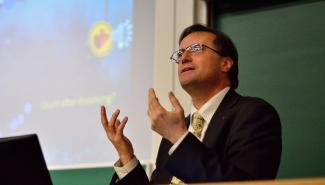
Since the 1940s there has been concern over the effect on humans of ultrasound in air in an occupational setting, although claims of such effects have been challenged. Because of this and a lack of good-quality basic research, efforts to place effect limits on exposures has been difficult. Several countries placed guidelines in place for occupational exposure. Occupational exposures range from jet-engine noise (largely discredited) and from ultrasonic industrial devices, such as cleaners, welders etc.
In 2016 Professor Leighton published an article in the Proceedings of the Royal Society revealing, for the first time, the existence of ultrasound in public places, giving an uncontrolled population exposures to which they were aware. He revealed the problems in the current occupational guidelines, and why they were inappropriate for application to public exposures.
Initially the scientific community were sceptical that such a phenomena could exist and be problematic, but by 2018 the Professor’s arguments had convinced enough scientists and engineers that they asked him to edit a Special Issue on the topic, to which over a dozen scientists wished to contribute. More scientists started to work on the topic, and Professor Leighton was asked to organize them to lecture on their contributions to this research field by the International Congress on Acoustics asked for him to organize a Special Conference Session in Aachen, Germany, in 2019; and the Acoustical Society of America also asked him to organize a Special Conference Session in Minneapolis, USA, in 2018 (co-organized with Dr Craig Dolder, who was then working in Professor Leighton’s research group at the University of Southampton, and in 2019 became Senior Scientists at SWT).
The issue has now become recognized as sufficiently important that the International Commission on Non-Ionizing Radiation Protection (ICNIRP) has decided to revise international safety guidance and, through nomination by members of the Commission, the Executive Council of the International Radiation Protection Association (IRPA), the IRPA Associate Societies, and national radiation protection agencies across over 30 nations, appointed Professor Leighton to the Commission’s Scientific Expert Group to move towards drafting new international safety guidelines.